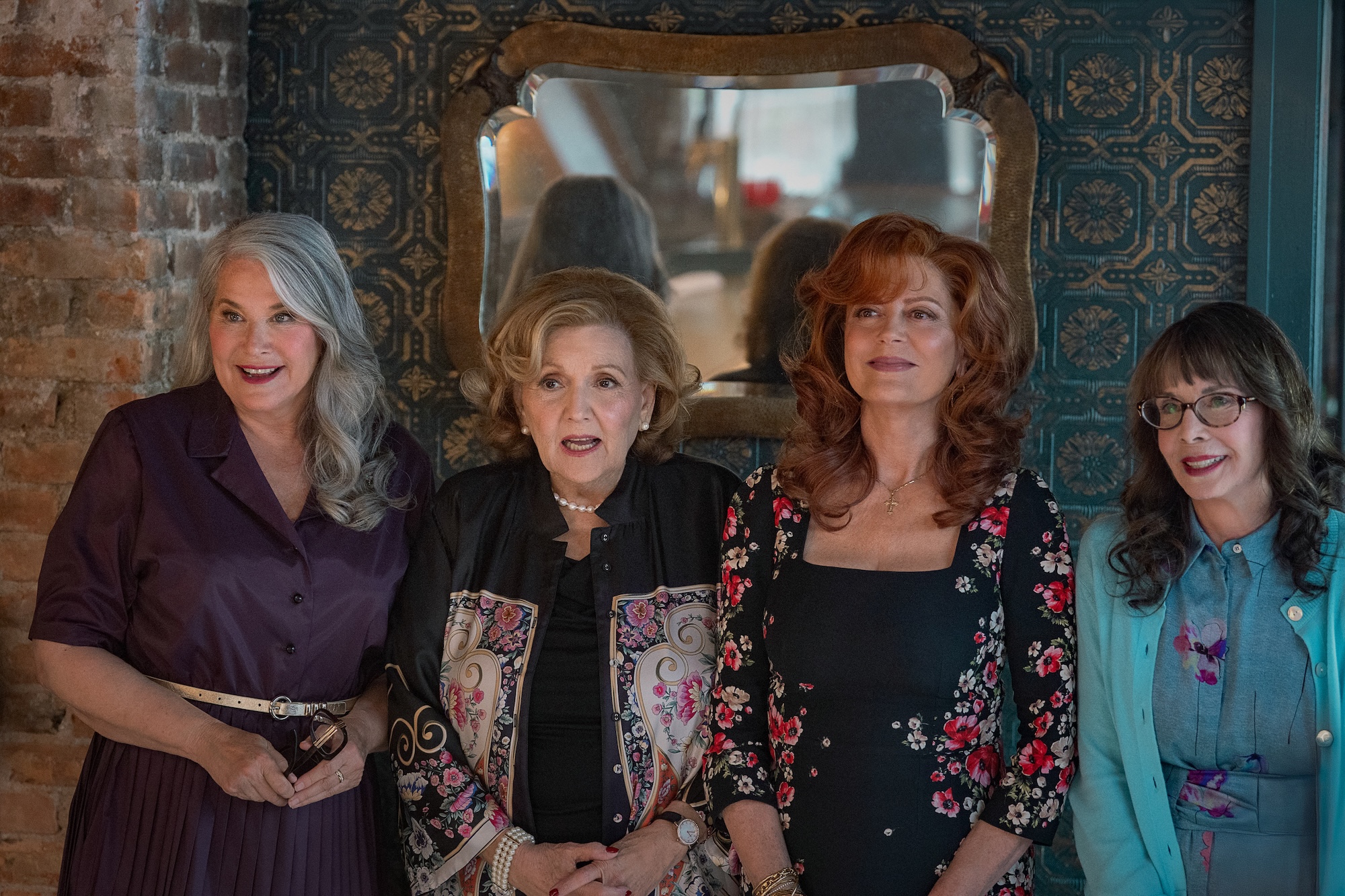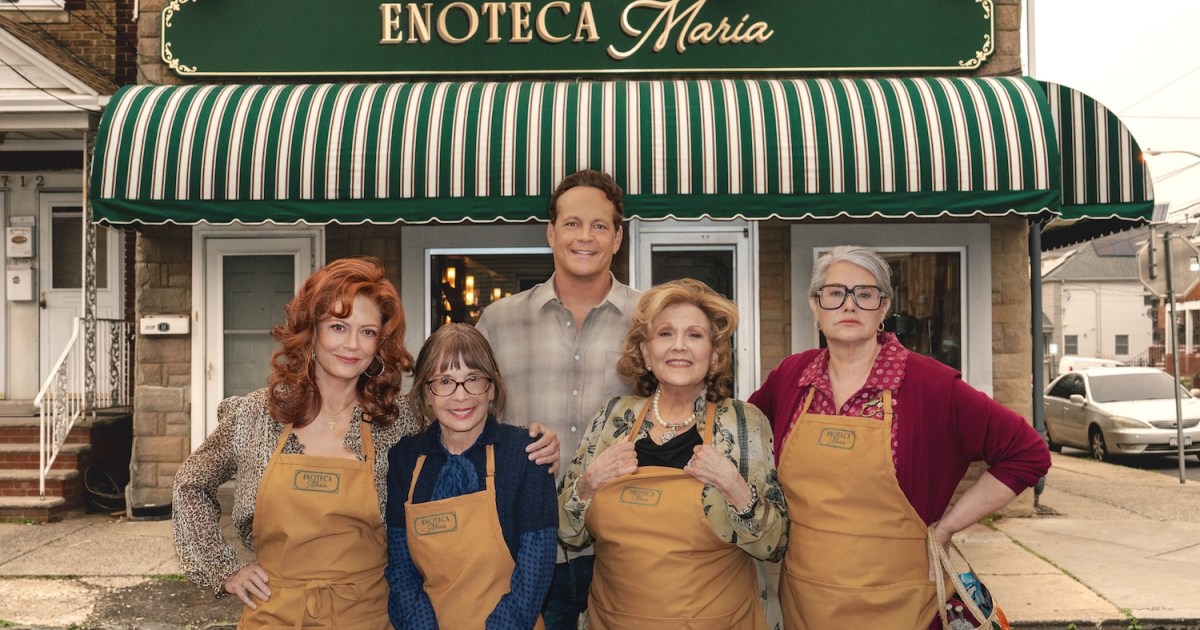Coming from an Italian-American heritage, I know the importance of family dinners. And yes, many Italians love to cook Sunday sauce (or gravy, depending on who you ask) and eat dinner before most college kids wake up from a Saturday night out. Sitting down to break bread and share a meal is the backbone of any united household. Nonnas, the new Netflix family comedy, understands this principle: food is love.
From a young age, Joe Scaravella (Vince Vaughn) immediately grasped the concept of food and family by spending time in the kitchen with the matriarchs. As a single adult living in South Brooklyn, Joe loses that wholesome feeling following the death of his mother. With no direction home, Joe risks it all to open an Italian restaurant in Staten Island. The kicker? Joe’s chefs are grandmothers, aka Nonnas: Gia (Susan Sarandon), Roberta (Lorraine Bracco), Teresa (Talia Shire), and Antonella (Brenda Vaccaro).
Ahead, director Stephen Chbosky and screenwriter Liz Maccie explain why Nonnas is a love letter to food and family. The married duo discusses iconic dinner scenes and the cast’s immense talent.
This interview has been edited for length and clarity.
Digital Trends: One of the lines in the movie I love is the idea that food is love. It’s the importance of sitting down for dinner and sharing a meal. There have been so many dinner scenes in movies. If you could each go back in time and sit in on the day when a famous dinner scene was filmed, what movie would you pick?
Liz Maccie: Oh my god. What a great question.
Stephen Chbosky: Wow, that’s something else. Well, you just blew our minds, dude. I’ll tell you, six hours in, I was like, “Where was this guy?”
I had a later time!
Chbosky: They just had that 40th anniversary, the big panel everyone’s talking about. The lunch scene in The Breakfast Club. Why not? I would have loved to be the sixth kid there just going [puts hands under chin and looks around]; that would have been pretty special.
Maccie: I know this is crazy, but I just keep thinking Sideways is one of our favorite movies. That dinner scene when they go to the Hitching Post, which is one of our favorite restaurants … that’s it for me.
Chbosky: That would have been great, too.
Those are great picks, and they involve wine.
Maccie: [Laughs] Oh yes, it’s got to involve wine.
The saying “get out of the way and let them cook” is applied to this movie, especially when you have Vince, Talia, Lorraine, Brenda, and Susan in one kitchen. That’s a lot of greatness. As a writer and a director, how do you approach scenes and find the balance of hitting the lines and getting your beats with getting out of the way and letting them [the actors] cook?
Maccie: [Laughs] You have such good questions. For me, I really just wrote from a very authentic place of what my childhood was and what those women in my life were like. These four women are so many pieces of the women in my life. Like, that’s how they were. So for me, it was just writing from a very truthful place.
Chbosky: For me, I love my wife’s script, obviously, because I wanted to do it. I knew that it was so foundationally brilliant, and it had so many great lines. But when you have talent like that, I think there’s a balance of just saying, look, they all signed on because they love the script, not because they didn’t. They would do the lines, and then we’d have it. Then it’s like you let them go and do other things and go to other places with talent like that.
You mentioned the five, but Linda Cardellini, Joe Manganiello, and Drea de Matteo, the same thing. They just had such an ease. They lived the parts. They brought their own experiences, their own autobiography, so you let them roll and just watch the magic, watch the sparks fly. It was a pretty remarkable set to be on, I have to tell you.

With your projects, Stephen, there are ideas of finding hope, starting over, and finding one’s purpose. With your experience, what’s the secret or, for lack of a better term, the special sauce in crafting these character-driven stories?
Chbosky: There’s a great thing. It’s what you do with kids as well. You hide the vegetables. What I mean by that is a long time ago, I got wonderful advice from a great actor, John Malkovich, who produced a movie for me, The Perks of Being a Wallflower. I’ll never forget it. He said, “Because I love your script, because you have real heart, you don’t need sentiment. Direct this movie like a guy from Pittsburgh. Always get the tough take.”
He said those exact words. I never forgot them. They inform so much. When developing a project or recognizing a great script, it’s recognizing that there is always a lighter way of saying the thing. There’s always a more hopeful way of saying something, but without ignoring challenges or ignoring grief or the many struggles that all people have. That’s it.
It’s like Monty Python’s Always Look on the Bright Side of Life. When you can have a laugh, take it because the truth is that grief is real. Struggle is real, and people lose businesses all the time. By showing the reality of this, the colors of it, I think that’s the secret ingredient, honestly. Hide the vegetables. I’d say that to any filmmaker.
Nonnas is now streaming on Netflix.
Read the full article here














